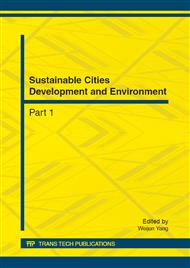[1]
Guoliang Liu, Youming Su, Shumin Gu, et al. New progress in bioremediation of petroleum-contaminated soil [J]. Chemistry & Bioengineering, 2008, 25(8): 1-4(In Chinese).
Google Scholar
[2]
Guoling Cheng, Peijun Li, Phytoremediation and microbial remediation of petroleum contaminated soil [J]. Chinese Journal of Environmental Engineering, 2007, 1(6): 397-400(In Chinese).
Google Scholar
[3]
Anderson T A, Guthrie E A, Walton B T. Bioremediation in the rhizosphere, plant roots and associated microbes clean contaminated Soil [J]. Environ Sci Technol., 1993, 27(13): 2630-2636.
DOI: 10.1021/es00049a001
Google Scholar
[4]
Ryan K M, Mary K F. Phenanthrene degrader community dynamics in rhizosphere soil from a common annual grass [J]. Environ Qual., 2000 (29): 584-592.
DOI: 10.2134/jeq2000.00472425002900020029x
Google Scholar
[5]
Xinping Qian, Yongrong Yang, Qin Meng. The effect of biosurfactants on microbial growth and metabolism [J]. Microbiology, 2002, 29(3):75-79(In Chinese).
Google Scholar
[6]
Miao An, Qi Zhou, Hui Li, Affect factors in bioremediation of contaminated soil [J]. Soil and Environmental Sciences, 2002, 11(4):397-400(In Chinese).
Google Scholar
[7]
Chuanhui Gu, Guizhu Chen, Research of bioremediation condition of petroleum contaminated soil [J]. Ecologic Science, 2000, 19(4):67-72(In Chinese).
Google Scholar
[8]
Jun Qiao, Wei Chen, Chengdong Zhang. Bioremediation of petroleum contaminated soil by various nutrient amendments [J]. Environmental Chemistry, 2010, 29(1): 6-11(In Chinese).
Google Scholar
[9]
Ye Li, Xincai Chen, Yanxin Wang. Optimum Ecological Condition for Bioremediation of Petroleum-contaminated soil [J]. Environmental Science and Technology, 2004(4):17-19(In Chinese).
Google Scholar
[10]
Yongqinag Qi, Hongqi Wang, Jingqi Liu. Impact of several factors on the bioremediation of oil in soil [J]. Acta Geosicientia Sinica, 2003, 24(3): 279-284(In Chinese).
Google Scholar
[11]
Hongqi Wang, Xuguang Hao, Yujiao Sun, et al. Selection, identification and degradation characteristics of cold-resistant petroleum-degrading strains in soil[J]. Journal of Beijing Normal University (Natural Science), 2009, 45(5/6): 509-514(In Chinese).
Google Scholar
[12]
Qian Wang, Hongqi Wang, Ying Xiong, et al. Study on the combination remediation of petroleum contaminated soil by degrading bacterial and winter wheat, EPPH2011.
Google Scholar


